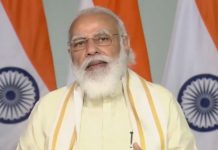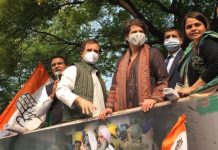 On January 26, when hooligans breached the Red Fort, Indians worth their salt said: Enough is enough. They were not prepared to see any other flag fly next to the tri-colour, even if it was several notches below. Nor were they prepared to be shamed before the world.
On January 26, when hooligans breached the Red Fort, Indians worth their salt said: Enough is enough. They were not prepared to see any other flag fly next to the tri-colour, even if it was several notches below. Nor were they prepared to be shamed before the world.
That afternoon India, in one sense, stood united in this far no further sentiment. That afternoon, in a single stroke, the farmers’ movement lost much of what it had gained in the 60-day long agitation. Consequently, there were visible signs of the movement scattering with large numbers of farmers returning home: some voluntarily and some because there was pressure from the locals wanting farmers to vacate the borders they had occupied since November last year.
This anger helped the Police immensely: they were able to crackdown on protesters without worrying about fingers being pointed at them. The sum total: the agitation had lost steam and the protesting farmers were seemingly on the backfoot. The Government, it seemed, had an upper hand: after months of being at the receiving end. It was this that led many in the Opposition to allege that the violence was orchestrated.
 Yet tears did what guns could not. It took a farmer’s son to turn the tables and revive a movement that had suffered a setback.
Yet tears did what guns could not. It took a farmer’s son to turn the tables and revive a movement that had suffered a setback.
Legendary farm leader Mahendra Singh Tikait’s son, Rakesh, took to the stage and made an emotional appeal. With tears in his eyes, he said that he would commit suicide rather than end the protest.
By all accounts, Tikait’s tears gave the movement a new lease of life: “Our leader” said the Jats, a community that Tikaits belong to, “is crying in Delhi and we are sitting at home” was the popular sentiment as thousands of farmers hit the roads once again: hundreds of tractors headed towards Ghazipur border which within hours was re-energized. Overnight, Tikait became the face of the farmers movement.
 His call, a bit misplaced though, that the agitation would continue till October if not later, gave an inkling that whatever the Government may do, the farmers would not relent. For those who are on neither side, this seems a bit unreasonable. It is as if the farmers are hell bent on continuing the agitation rather than resolving the matter.
His call, a bit misplaced though, that the agitation would continue till October if not later, gave an inkling that whatever the Government may do, the farmers would not relent. For those who are on neither side, this seems a bit unreasonable. It is as if the farmers are hell bent on continuing the agitation rather than resolving the matter.
Enter international pop star Rihanna: she posted a tweet which added fuel to fire, to say the least. Using the hashtag “Farmers Protest”, she tweeted: “Why aren’t we talking about this?”.
With this, she took the internet by a storm. With over 90 million followers and still counting, Rihanna’s post on Twitter not only went viral but prompted two other celebrities to follow suit: Activist Greta Thunberg and actor turned model Mia Khalifa.
Within hours of Rihanna’s tweet, Thunberg and Khalifa also woke up to the ongoing farmers protests in India. Add to that Meena Harris, U.S. Vice President Kamala Harris’s niece: one by one all came out in support of the protesting farmers.
If Thunberg tweeted “solidarity” with the farmers protest in India, Mia Khalifa asked, “What in the human rights violations is going on?”. Meena Harris meanwhile said: “We should be outraged by India’s internet shutdowns and paramilitary violence against farmers protestors”. The Indian Government, it may be mentioned, had temporarily suspended internet services on the Delhi border last month. This, the government order said, was being done “in the interest of maintaining public safety and averting public emergency”.
In the eye of a storm is a “toolkit” posted by Thunberg which shows ways to extend support to the on-going farmers protests in India.
The “toolkit” document shared by Thunberg encourages people to sign a petition condemning “state violence” against protesting farmers while urging the Indian government to listen to them. Apart from posting different hashtags to use on Twitter to support the issue, the toolkit asks people across the world to organize protests near Indian embassies and local offices of the Indian government. Put simply the document not only extends a whole-hearted support to the farmers anti-government movement but also asks them to become a part of the movement.
It may be mentioned here that during the anti-CAA protests, a toolkit suggesting twitter hashtags, places to protest and what to do tips if the cops swoop down were widely shared.
This time around the Police lost no time and filed a complaint against the creators of the toolkit that Thunberg had posted. It indicated its link to the Poetic Justice Foundation that is believed to support the Khalistan movement, aimed at creating an independent state for the Sikhs. The Police filed an FIR on charges of sedition, criminal conspiracy and promoting hatred with an intent to “create disharmony among various social, religious and cultural groups and encourage disaffection and ill-will against the Government of India.
But it did not end here.
The Government, through the Foreign Ministry, too swung into action and condemned what it called “sensationalism” by “foreign individuals”. It called out the “vested interest groups trying to enforce their agenda”. Union Home Minister Amit Shah said that “no propaganda can deter India’s unity”.
Since Rihanna’s tweet with others in tandem, the focus seems to have shifted from the protests to foreign interference in domestic affairs. Not only celebrities but political leaders across the world have meddled in what essentially is and should remain India’s internal matter.
For starters, it was Canadian Prime Minister Justin Trudeau who asserted that Canada would defend the right of peaceful protests. Close on its heels, UK parliamentarians too expressed solidarity by asking their Foreign Secretary Dominic Raab to take up the issue with the Modi government. Equally, the US asked the Indian government to recognise peaceful protests and allow access to the internet.
There are takers within India, particularly from among the farmers and their supporters, who credit Rihanna for raking up the issue internationally and help garner overseas support. She was hailed for “bringing global attention to an important cause.”
Against these attempts to internationalize the issue, the Indian Government stood its ground. Maintaining that this is India’s internal matter, it decried foreign intervention. On this count, it seems to have support from those who place the country above all else.
Celebrities including Virat Kohli, Sachin Tendulkar, Akshay Kumar and a host of others came together using the hashtag: ‘India against propaganda’. Whether these were coordinated by BJP’s social media managers remains a moot point but the sentiment that came across was that majority Indians were against outside interference. Therefore a call from several functionaries of the government including ministers to join hands and denounce outsiders who try to break the country has heft.
However, the government has other issues to combat: beginning with the perception battle to keep India’s image intact on the world stage. That it has been besmeared is a given and however much support the government may garner on the nationalist plank, it cannot wash away the bloodstains of the ongoing protests by the farmers.
Rewind a year ago and the anti-CAA protests are also a dark memory about the Modi government’s intolerance towards dissent. Therefore, while it has takers on keeping India’s internal matters within, it is on a sticky wicket on the way its agencies, especially the Police have handled them.
In this context what it cannot sweep under the carpet, even while it is desperate to do so, are the FIRs filed against well- known journalists.
Those also began with tweets: the trigger being the death of a protestor Navneet Singh amid allegations that he died as a result of police firing as against the official version that he died because his tractor overturned. Reports were published and eye witness accounts tweeted in what the Government described as an attempt to incite hatred and endangering the nation’s integrity through inaccurate reporting and tweets. Over half a dozen journalists and a Congress MP are legally fighting sedition cases slapped against them.
Apart from this being a blatant attempt to throttle free press, the FIRs are also a concerted attempt to send a strong and stern message to others in the fraternity to step back or think twice before slamming the present regime. The fact that high profile and credible journalists, both from the print and visual media, have been handpicked for action is to demonstrate that if push comes to shove, the government will stop at nothing.
Media apart, politics is also playing out between the BJP and the non BJP government in Maharashtra. Once again it is over tweets which are going viral.
The Uddhav Thackeray-led state government in Maharashtra has decided to probe celebrities including Lata Mangeshkar and Sachin Tendulkar: whether they were pressured by the Centre to tweet their support of the farm laws. Both Tendulkar and Mangeshkar are recipients of the Bharat Ratna: the country’s highest civilian award. The probe, as per the state government, is necessitated because the tweets are similar in nature and were posted around the same time. The investigation has been sought by the Congress which is a coalition partner in Maharashtra.
Of course the state government has been slammed for such a move even while it blames the Centre for dragging celebrities to counter the global attack on the Indian government on grounds that Mangeshkar and Tendulkar are legends and by using them the Centre has put their reputation at stake.
Irrespective, the war of words and one on the ground, has cost the Modi-led government heavily. It may have arguments to support the farm laws or proof that the Congress was at one time pushing them but what it cannot escape is the public censure it has received at mishandling the protests and going that extra mile to quash dissent. Therefore however strong its logic may be for implementing the laws what it cannot defend is the rough shod manner in which they were pushed. It may well flag the Indian spirit of standing together against foreign interference or meddling so to say but it cannot wish away the fact that India’s image has taken a beating both within and overseas.
letters@tehelka.com













